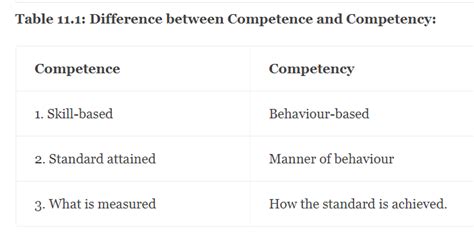Competence Vs. Competency: Understanding The Difference

When it comes to discussing skills and abilities, the terms “competence” and “competency” are often used interchangeably. However, there is a subtle difference between the two that is important to understand. In this article, we will explore the definitions of competence and competency, their distinctions, and why it is crucial to differentiate between them.
1. Defining Competence
Competence refers to having the necessary knowledge, skills, and abilities to perform a specific task or job effectively. It encompasses both theoretical understanding and practical application. Competence is typically measured against established standards or criteria and can be developed through education, training, and experience.
1.1 The Importance of Competence
Competence is crucial in ensuring that individuals and organizations can perform their roles and responsibilities effectively. It allows for efficient and confident decision-making, problem-solving, and task execution. Competence also contributes to personal and professional growth, job satisfaction, and overall success.
1.2 The Development of Competence
Developing competence requires a combination of formal education, practical training, and experiential learning. Continuous professional development and staying updated with industry trends and advancements are essential for maintaining and enhancing competence.
2. Understanding Competency
Competency, on the other hand, refers to specific behaviors, skills, or attributes that contribute to the overall competence of an individual. It is a subset of competence and focuses on the observable and measurable aspects of performance. Competencies are often defined and outlined in competency frameworks or competency models.
2.1 Different Types of Competencies
Competencies can be categorized into three main types:
- Core Competencies: These are the essential skills and behaviors required for a particular role or profession. They are typically applicable across various industries and organizations.
- Functional Competencies: These are specific skills and knowledge required for a particular function or job within an organization. They may vary depending on the nature of the work.
- Behavioral Competencies: These refer to the personal attributes and behaviors that contribute to effective performance and interpersonal relationships. They are often related to communication, teamwork, leadership, and problem-solving.
2.2 Assessing Competencies
Assessing competencies involves evaluating an individual’s demonstration of specific skills and behaviors. This can be done through various methods, such as interviews, performance evaluations, assessments, and simulations. Competency assessments provide valuable insights into an individual’s strengths, areas for improvement, and potential for growth.
3. Differentiating Competence and Competency
The key difference between competence and competency lies in their scope. Competence is a broader concept that encompasses the overall knowledge, skills, and abilities required for a task or job. It is a more comprehensive assessment of an individual’s capabilities.
On the other hand, competency focuses on specific skills, behaviors, or attributes that contribute to the overall competence. It is a narrower evaluation of an individual’s performance in relation to predefined criteria.
4. FAQ
4.1 What is the significance of distinguishing between competence and competency?
Distinguishing between competence and competency allows for a more precise assessment of an individual’s skills and behaviors. It helps in identifying specific areas for improvement and tailoring development plans accordingly.
4.2 How can competencies be developed?
Competencies can be developed through a combination of formal education, practical training, and experiential learning. Continuous professional development and staying updated with industry trends and advancements are essential for enhancing competencies.
4.3 How are competencies assessed?
Competencies can be assessed through various methods, such as interviews, performance evaluations, assessments, and simulations. These assessments provide valuable insights into an individual’s strengths, areas for improvement, and potential for growth.
4.4 Are competencies applicable across different industries?
While core competencies may be applicable across various industries and organizations, functional competencies may vary depending on the nature of the work. It is essential to consider industry-specific requirements when assessing and developing competencies.
4.5 What role do competencies play in job performance?
Competencies play a significant role in job performance as they contribute to effective decision-making, problem-solving, and task execution. Behavioral competencies, such as communication, teamwork, leadership, and problem-solving, are particularly important for successful performance and interpersonal relationships.
In conclusion, understanding the difference between competence and competency is essential for accurately assessing and developing skills and behaviors. Competence encompasses the overall knowledge, skills, and abilities, while competency focuses on specific skills and attributes. By recognizing and developing both, individuals and organizations can strive for excellence and success in their respective fields.
